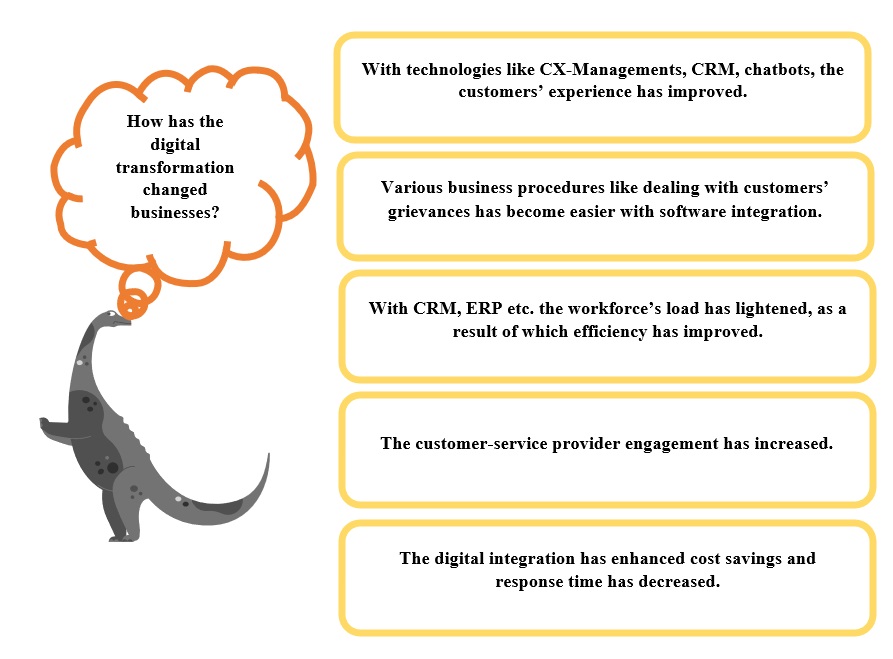APIs and Digital Transformation – Why Does Your Company Need To Evolve?

“At least 40% of all businesses will die in the next 10 years… if they don’t figure out how to change their entire company to accommodate new technologies.”
~ John Chambers, Cisco
The market is constantly changing today and keeping the business viable in this hullabaloo is turning even more challenging by the day. What is the evolution in business? How has the digital transformation affected or improved businesses today? Does API have a major role to play in this tech-evolution? Let us find the answers to these questions and understand the role of technological evolution across the business industries today.
What is Evolution in Business?
It would be unintelligible to ignore the digital transformation in the business today. From software integration to sophisticated technological advancements like artificial intelligence, tech-evolution has made a strong mark upon businesses lately. Since 1990, when the world wide web was first launched, the world of business has only looked forward with a new software winning its way into organizational success journeys each passing day.

What Is the Role of APIs in Business Evolution?
API or Application Software Interface is the medium through which two different apps can communicate with each other. These are the spine of the everyday technology that we use such as booking tickets, hotel bookings, buying and selling of products etc. The strategy of integrating APIs in a business marks its stride upon the path to success. Following are the business benefits of a strategic API integration:
- API integration helps the developers to focus on the delivery of specific functionality as they involve the third-party API for pre-existing functions. This way, an organization saves a great deal of time and money, which in a way has improved the software development competency.
- The business developer-end user experiences are remodeled and enriched.
- Sustainable API security software have enabled autonomous working between individual teams and developers without any security or authentication issues.
- The complexity of SaaS and cloud systems are simplified with APIs as the developers can efficiently connect the apps across the clouds.
Impact of Tech-Evolution and Digital Transformation on Businesses
The forward momentum of technological advancement looks tremendously promising as we come across the positive impact of digital transformation on businesses.
- With businesses having connected themselves with apps, the products and service accessibility has widened its sphere. Customers can now have an improved experience with services being just a click away.
- Cloud computing has presented businesses with rapid data and mobility by involving third-party servers to move certain business operations.
- The consumer-vendor relationships have improved.
- Digital transformation has bettered resource management by consolidating resources, data, and other relevant information in one place.
- The business strategy as a result of the digital transformation has become customer-centric. By taking into account the customer insights, the businesses have accelerated their growth.
- The revenue growth has seen a significant increase. Data suggests that 80% of the companies have reported a rise in profit post-digital transformation and 85% have expanded their market share.
- Businesses have become more innovative and agile.
- Data integration and task automation have increased productivity and improved the workflow.
“Every industry and every organization will have to transform itself in the next few years. What is coming at us is bigger than the original internet, and you need to understand it, get on board with it, and figure out how to transform your business.”
~ Tim O’Reilly, Founder & CEO of O’Reilly Media
Even though the organizations have hugely applauded the technology growth and have adopted various digital methods to improve the overall company growth, yet this transformation has seen some minute setbacks too. There are few spheres where digital transformation has failed to manifest its capacity, such as, lack of recognition of goals and thus a failure to execute the technology for business benefits; the lack of willingness to change or adapt to the contemporary tech demands fails to complement the digital implementation; and less skilled workforce that leads to lack of understanding and use of the software and other digitally advanced tools.
Yet, the positive side of this evolution certainly overshadows its minuscule failures.